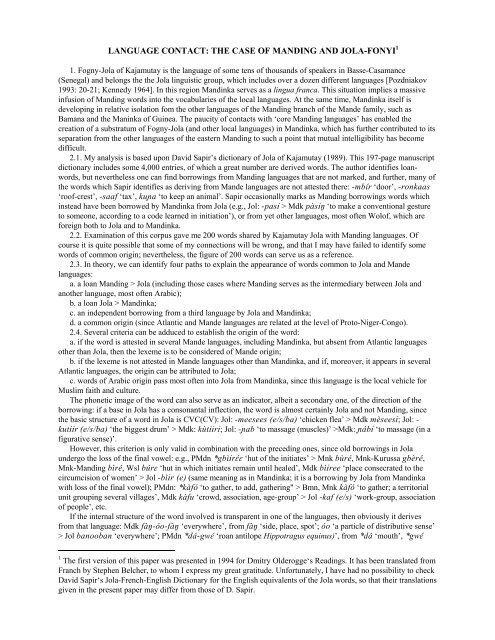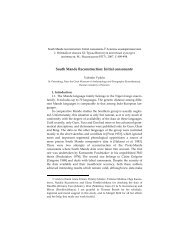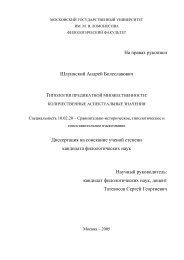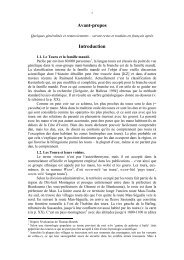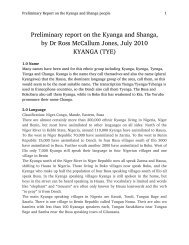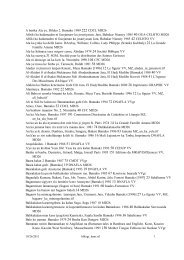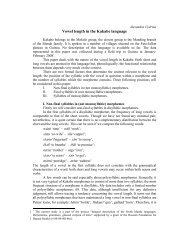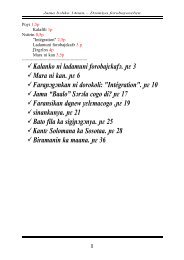loanwords
LANGUAGE CONTACT: THE CASE OF MANDING AND JOLA-FONYI1
LANGUAGE CONTACT: THE CASE OF MANDING AND JOLA-FONYI1
You also want an ePaper? Increase the reach of your titles
YUMPU automatically turns print PDFs into web optimized ePapers that Google loves.
LANGUAGE CONTACT: THE CASE OF MANDING AND JOLA-FONYI 11. Fogny-Jola of Kajamutay is the language of some tens of thousands of speakers in Basse-Casamance(Senegal) and belongs the the Jola linguistic group, which includes over a dozen different languages [Pozdniakov1993: 20-21; Kennedy 1964]. In this region Mandinka serves as a lingua franca. This situation implies a massiveinfusion of Manding words into the vocabularies of the local languages. At the same time, Mandinka itself isdeveloping in relative isolation fom the other languages of the Manding branch of the Mande family, such asBamana and the Maninka of Guinea. The paucity of contacts with ‘core Manding languages’ has enabled thecreation of a substratum of Fogny-Jola (and other local languages) in Mandinka, which has further contributed to itsseparation from the other languages of the eastern Manding to such a point that mutual intelligibility has becomedifficult.2.1. My analysis is based upon David Sapir’s dictionary of Jola of Kajamutay (1989). This 197-page manuscriptdictionary includes some 4,000 entries, of which a great number are derived words. The author identifies <strong>loanwords</strong>,but nevertheless one can find borrowings from Manding languages that are not marked, and further, many ofthe words which Sapir identifies as deriving from Mande languages are not attested there: ,la’q ‘door’, ,qnmj``r‘roof-crest’, ,r``e ‘tax’, jtÕ` ‘to keep an animal’. Sapir occasionally marks as Manding borrowings words whichinstead have been borrowed by Mandinka from Jola (e.g., Jol: ,o`rh > Mdk o»rhÀ ‘to make a conventional gestureto someone, according to a code learned in initiation’), or from yet other languages, most often Wolof, which areforeign both to Jola and to Mandinka.2.2. Examination of this corpus gave me 200 words shared by Kajamutay Jola with Manding languages. Ofcourse it is quite possible that some of my connections will be wrong, and that I may have failed to identify somewords of common origin; nevertheless, the figure of 200 words can serve us as a reference.2.3. In theory, we can identify four paths to explain the appearance of words common to Jola and Mandelanguages:a. a loan Manding > Jola (including those cases where Manding serves as the intermediary between Jola andanother language, most often Arabic);b. a loan Jola > Mandinka;c. an independent borrowing from a third language by Jola and Mandinka;d. a common origin (since Atlantic and Mande languages are related at the level of Proto-Niger-Congo).2.4. Several criteria can be adduced to establish the origin of the word:a. if the word is attested in several Mande languages, including Mandinka, but absent from Atlantic languagesother than Jola, then the lexeme is to be considered of Mande origin;b. if the lexeme is not attested in Mande languages other than Mandinka, and if, moreover, it appears in severalAtlantic languages, the origin can be attributed to Jola;c. words of Arabic origin pass most often into Jola from Mandinka, since this language is the local vehicle forMuslim faith and culture.The phonetic image of the word can also serve as an indicator, albeit a secondary one, of the direction of theborrowing: if a base in Jola has a consonantal inflection, the word is almost certainly Jola and not Manding, sincethe basic structure of a word in Jola is CVC(CV): Jol: ,lddrddr 'd.r.a`( ‘chicken flea’ > Mdk l–rddrh; Jol: ,jtshhq 'd.r.a`( ‘the biggest drum’ > Mdk: j‡shhqh; Jol: ,Õ`a ‘to massage (muscles)’ >Mdk: Õ…ah ‘to massage (in afigurative sense)’.However, this criterion is only valid in combination with the preceding ones, since old borrowings in Jolaundergo the loss of the final vowel: e.g., PMdn )fa‘hqúô ‘hut of the initiates’ > Mnk a‡q—, Mnk-Kurussa fa–q—,Mnk-Manding a‘q—, Wsl a·qô ‘hut in which initiates remain until healed’, Mdk a‘hqdd ‘place consecrated to thecircumcision of women’ > Jol ,a‘hq 'd( (same meaning as in Mandinka; it is a borrowing by Jola from Mandinkawith loss of the final vowel); PMdn: )j»e¤ ‘to gather, to add, gathering" > Bmn, Mnk j»e¤ ‘to gather; a territorialunit grouping several villages’, Mdk j»et ‘crowd, association, age-group’ > Jol ,j`e 'd.r( ‘work-group, associationof people’, etc.If the internal structure of the word involved is transparent in one of the languages, then obviously it derivesfrom that language: Mdk e»À,¤n,e»À ‘everywhere’, from e»À ‘side, place, spot’; ¤n ‘a particle of distributive sense’> Jol a`mnna`m ‘everywhere’; PMdn )c…,fvú ‘roan antilope Hippotragus equinus)’, from )c… ‘mouth’, )fvú1 The first version of this paper was presented in 1994 for Dmitry Olderogge‘s Readings. It has been translated fromFranch by Stephen Belcher, to whom I express my great gratitude. Unfortunately, I have had no possibility to checkDavid Sapir‘s Jola-French-English Dictionary for the English equivalents of the Jola words, so that their translationsgiven in the present paper may differ from those of D. Sapir.
‘white’ > Bmnc…iô, Mnk c…faô, Mdk c…jnx > Jol ,q``jnx 'd.r(. But one must remain aware of the possibilitythat some part of the root borrowed as a morpheme may be reinterpreted in the receiving language: c.f. PMdn)l‘rúm ‘small, thin’ > Bmn l‘rúm, Mdk l—rdÀ ( < *l‘rdm ) > Jol ),lhrdm, where the terminal ,dm has beenreinterpreted as a verbal suffix, hence ),lhrdm > ,lhr ‘to be thin, to be narrow’ → ,lhrdm ‘to become thin’; Bmne·m`mjô ‘young man, adolescent, bachelor’, Mdk e¤mchmjdd, Mnk e·mhjd ‘young person’ > Jol ,…m’hm 'e(, also ,g…m’hm '`( ‘a true man, one who is manly’ (with the initial e, reinterpreted as a class marker); PMdn )fa⁄mc¤m‘granary’ > Bmn a⁄mc¤m, Mnk aòmcóm+ faòmcóm, Mdk a‡mstÀ > Jol at,mstÀ (at, is reinterpreted as a classmarker).If a word is attested in Jola, Mandinka, and Wolof, but does not exist in the eastern Manding languages, it mostprobably derives from Wolof, the dominant language of Senegal: Wlf sno`sn ‘to take care of’ > Mdk s⁄onsn, Jol ,snonsnnq ‘to take care of someone’; Wlf r`a`q 'f,( ‘a long drum with frills’ > Mdk r…a`qh, Jol ,r`a`q.If a root is widely represented both in the Mande languages and in the Atlantic languages, in forms which matchthe rules of regular correspondences, it can be attributed to the level of Proto-Niger-Congo, or might be considereda borrowing by Proto-Mande from Proto-Atlantic or vice versa: c.f.Wol c¤nkhmj` 'f,( ‘hook’, Jol q¤khÀ 'd.r( ‘hook and line’ – PMdn (?) ),c¤nkhm ‘hook, fishing-line’;or: Jol ,qnmsnnm 'j`.t( ‘vein’, Lmb ms`ms,`/ pl. x`ms,` ‘vein’, Ful ¡`¡,nk ‘root, vein’, Mjk bdms ‘navel’, m,bnmsr ‘root’, etc. [Pozdniakov 1993: 161]. SWM )MÖ,¡`ms` ‘vein, root’, PMdn )MÖ,c·khm (?) ‘root’ (> Bmn c’kh,Bdia mc’kh+ m’qh+ Mnk k’khm);Jol ,`latm+ ,``latm 'r( ‘fire’ – SWM )Àòla·, Snk xhlah.,d-Application of all these criteria allow us to establish with some degree of precision the direction of thetransmission of the loanword.2.5. The form of Manding <strong>loanwords</strong> in Fogny-Jola often allows some speculation on the date of their adoption.2.5.1. Starting with the thesis that Mandinka has always been the only Manding language in contact with Fogny-Jola, one can speak of layers of borrowings dating from different periods. Thus, in contemporary Mandinka (as wellas in Guinean Maninka), but not in Bamana, initial prenasalized consonants (derived from a Proto-Mande high-tonenasal prefix which marked a nominal class: [Pozdniakov, Vydrine 1986-87; Vydrine 1994] have disappeared: c.f.Bmn f¢m+ mf¢m ‘baboon’, Mnk faÉm+ fa¢m, Mdk j⁄À < PMdn )MÖ,jvòm;Bmn j…`mj``m+ j…`j` ‘crow’; Bdia f…`f``, Mnk j~`j~`, Mdk j…`m`` < PMdn )MÖ,j…`j``; cf. Snkw``wh.,d;Bmn rúlô+ rólh ‘marrow’, Bdia mrúlô+ yúlô, Mnk rúmaô < PMdn )MÖ,rómah (in Mdk the Manding base hasbeen supplanted by another, x·t).In Fogny-Jola, these lexemes were taken from Proto-Mandinka at a period prior to the loss of the nasal prefix: ,f¤À 'd.r( (but not )j¤À !) ‘baboon’, ,f``j` 'd.r( (but not ),j``j` ! ‘a species of crow’), ,bdla (b) ‘marrow’')mr =b(.The form of the Jola words ,anqnfn 'd.r( ‘sterile animal’ and ,i`f`sn 'e.j( ‘bitter tomato’ is evidence for theirpenetration into that language at a very old period, before the loss of the intervocalic velar consonants in Mandinka.Otherwise, we would expect to find the forms ),annqn+ ),i``sn; c.f. Bmn aòqñfú, Mnk aòqñjú, Snk anqnjn, Mdka⁄nqdd ‘sterile woman/female’; Bmn mi»f`q¤, Mnk i»`c¤, Mdk i»`sh ‘bitter tomato’.The borrowings of the “later generations” in Jola retain a form quite close to that of Mandinka, and especially tothe dialect of Casamance, which is distinct from other Manding idioms:Jol ,j·kkn ‘to make a decision in secret’ < Mdk j‡kn+ j‡kkn ‘secret’, c.f. Bmn f‡mc¤, Mnk fa‡mc·, PMdn)fv‡mc¤; Koranko fa‡mct+ Vai a⁄mc⁄ ‘fence area set aside for women’s initiation rites’, Susu fatmct+ atmct‘secret, secret meeting’, Soninke ftmcn+ Mende a‡mc‡+ a⁄mc⁄ ‘secret, private affairs; secret place; Sande bush’(c.f. also Ful ftmcn+ seemingly borrowed from Manding);Jol ,l``mf`q` 'd.r( ‘species of antilope’ < Mdk l»mj`qh.l»mj`qnn, c.f. Bmn l»mj…k`m+ l»mj`k`mm’m‘crownded duiker (Sylvicapra grimmia)’;Jol ,lhq` ‘to believe, to suppose’ < Mdk l’hq` ‘to think’, c.f. Bmn l’hqh, Mnk l’qh;Jol bdld ‘hundred’ < Mdk-Casamance b–ld, c.f. Mdk j–ld, Bmn j∆lú; c.f. also Mnk j∆lú+ b∆lú.3. It is to be observed that words pass from Mandinka to Jola 7.7 times more often than in the other direction(148-19 words in my list).3.1. The most characteristic Mandinka borrowings from Jola are linked to ritual activity or to the sea:Jol éinÀ ')r.r( ‘celebration’ > Mdk i¤À; Jol ,jtshhq 'd.r( ‘the largest drum’ > Mdk j‡shhqh;Jol ,o`rhÀ to make a conventional gesture to someone, according to a code learned in initiation’ > Mdk o»rhÀ;Jol ,ind ')d+ r.r( ‘island, hill’ > Mdk i⁄nxdd ‘island, cluster of isolated vegetation in an arid zone’;
Jol ,Õ`mj`q` 'd.r( ‘crab’ -> Mdk Õ»mj`qh.The other words in this group demonstrate a deep and close contact between the two groups: we find the words‘to be obliged to’, ‘to need’, ‘to massage’, ‘to raise’, probably ‘to spread’, ‘smile’, names of birds and insects, andsome lexemes relating to agriculture, etc.3.2. A quick analysis of the semantic fields of Fogny-Jola borrowings from Mandinka produces interestingresults. Contrary to expectations, we find few words relating to commerce. However, borrowings involving socialand family life are frequent, as well as the lexicon relating to agriculture and livestock (and especially the wordsindicating smaller livestock).The massive incorporation of Mandinka verbs in Jola is quite unusual (and we must note among these a highnumber of verbs pertaining to emotional expression, most often negative). It can also be observed that Fogny-Jolahas borrowed some names of animals and birds, borrowings which by their form can be attributed to a very earlyperiod.The low number of words relating to the sphere of religion stems from the low rate of Islamization among theJola, and a considerable list of auxiliary words (conjunctions, interjections, etc.) is evidence for a state ofwidespread bilingualism which favors the penetration of words from the dominant to the subordinate language.Word listI. Fogny-Jola Words Transmitted to MandinkaJol ,b``k` 'd.r( ‘small bony fish’ > Mdk b…`kh ‘a very good, but bony fish’Jol ,aknÀ ‘small watercourse’ > Mdk a¤knÀ ‘small river, brook’Jol ,eds ‘to stretch, to spread (a sheet, wings)’ > Mdk e–dsdd ‘to spread (arms, etc.)’Jol i`k` 'd.r( ‘fishing net’ > Mdk i»k`Jol ,ind 'r.r+ )d( ‘island, hill’ > Mdk i⁄nxdd ‘island, cluster of vegetation in an arid zone’Jol inmjnÀ 'r.r( ‘bathing spot’ > Mdk i⁄mjnÀ ‘shower-stall’Jol inÀ ')r.r( ‘celebration’ > Mdk i¤ÀJol ,j`b` 'd( ‘bird: weaver-bird, millet-eater’ > Mdk j…b` ‘a small bird’Jol ,jtshhq 'd.r( the largest drum’ > Mdk j·shhqhJol ,Õ`a ‘to massage the muscles’ > Mdk Õ…ah ‘to massage, in a figurative sense’Jol Õ`mj`q` 'd.r( ‘crab’ > Mdk Õ»mj`qhJol Õ`mj`s`À ')d( ‘plate of plain boiled rice’ > Mdk Õ»mj`s`À ‘dish based on rice and fonio’Jol ,Õ`À'dm( ‘to be obliged to, to have to’ > Mdk Õ`ÀJol ,o`rhÀ ‘to make a sign to a friend, unbeknownst to others’ > Mdk o»rhÀ ‘to make a conventional sign tosomeone, according to a code learned during initiation’.Jol ,lddrdr 'd.r.a`( ‘chicken flea’ > Mdk l–rddrh ‘poultry flea’Jol ltltm 'd.r( ‘mute’ > Mdk l‡tltmdd? Jol ,ltÕtk ‘smile broadly’ > Mdk l·xh ‘smile’Jol ,q``mjnsnÀ ‘hoe with a short handle and a broad blade’ > Mdk (reg. Kombo) c¤mjnsnÀ ‘a large hoe’ (D. Sapirconsiders this word in Jola a borrowing from Manding, but this seems quite doubtful to me, given that it isattested in no other Manding language except this isolated Mandinka dialect)Jol ,r`k` 'd.r( ‘bridge’ > Mdk r…k`Jol ,rdk 'j`.t( ‘brush (in a cultivated field, by the path)’ > Mdk r–dkh ‘place cleared for the first time, strewn withfallen trees’Jol ,sdo ‘carry’, ,sdadm ‘to lift a load’ > Mdk s—da`+ s—dj` ‘to lift by taking in the hands’.II. Borrowings from Mandinka in Jola-Fogny1. Verbs and AdjectivesPMdn )a…m ‘to end’, Mdk a…À > Jol ,a`mPMdn )a°m ‘to meet, to agree, agreement’ > Jol ,adÀ ‘to resemble from a distance’; ,a—À ‘to agree’Bmn, Mnk aòmó ‘loss, to lose (a relative, etc.)’, Bmn aòmú ‘loss’, Snk anmn.anmd ‘misfortune’, Susu añmñ+ Bozo-Tieyaxo añmñ , Mdk a⁄mn ‘to lose’ > Jol ,anmn ‘to lose, loss’ (cf. Ful anmd ‘misfortune’ < Mdn?)? Bmn aúmaúm ‘to caress’ > Jol ,atladm ‘to spoil a child’? PMdn )e…c` ‘to divide, to part’, Mdk e…s` > Jol ,e`b ‘to divide’ (this root, however, seems to be well representedin other language families of West Africa)Bmn, Mnk e…m ‘forge’ >Jol ,e``Õ ‘to forge’PMdn )i∆mFú ‘to leave the path, to move away’ > Mdk i–mjd > Jol ,i’Àn ‘to lie on the side, to move away’Bmn jóm ‘to forbid, to isolate’, Mdk j¤À ‘to hate’ > Jol jÉm ‘look angrily at someone’
PMdn )j⁄¡h ‘to be weak, tired, to fail’, Mdk j⁄qh+ j⁄qhh > Jol ,jnqh ‘to be tired of, to have had enough’PMdn )jò¡ñrh ‘to examine, to observe’, Mdk j⁄qnrh > Jol ,jnqnrh ‘to look attentively’? Mdk j‡ktt ‘to educate’, Bmn, Mnk j¤knm ‘to raise, to educate’ > Jol ,jtq ‘to raise someone, to care for (ananimal)’Koranko fa‡mct+ Vai a⁄mc⁄ ‘fence area set aside for women’s initiation rites’, Susu fatmct+ atmct ‘secret,secret meeting’, Soninke ftmcn+ Mende a‡mc‡+ a⁄mc⁄ ‘secret, private affairs; secret place; Sande bush’, PMdn)fv‡mc¤ > Bmn f‡mc¤, Mnk fa‡mc·+ Mdk j‡kkn+ j‡kn > Jol j‡kkn ‘to make a decision in secret’ (cf. c.f. alsoFul ftmcn+ seemingly borrowed from Manding)? Bmn v»f…+ v~` ‘to open by spreading’, Mdk v»mj` ‘to stretch, to spread out (arms, etc.)’ >Jol ,À``À ‘to openthe mouth wide’? Mdk, Bmn À‡mtÀtmt ‘to murmur’ > Jol À·mhÀtm ‘bad words about someone, spoken low’PMdn )l’rôm ‘small, thin’, Mdk l—rdÀ > Jol ,lhrdm ‘to get thin’ → ,lhr ‘to be thin, narrow’ (reinterpretation ofthe final ,dm as a verbal suffix; the same root is probably represented in other Balante languages under the formsÕhr+ Àkhr [Podzniakov MS])Bmn l‘’q’ ‘to believe, to think’, Mdk l’hq` > Jol ,l’q` ‘to believe, to suppose’Bmn l‡lú ‘whole, entire’, Mdk l‡tldd > Jol ltld? Bmn c∆lú ‘to help, assistance’, Mnk c∆lúm, Mdk c–dl` > Jol q`ladÀ? Mdk c…`mh ‘to beg, to beseech’ > Jol ,q``mn ‘to want, to desire’Susu r`msh ‘to comb’, Mnk, Bmn, Mdk r…msh ‘comb’ > Jol ,r`ms ‘to comb oneself’Bmn r…mf` ‘to compete with somebody, to try to be equal to’ , Mdk r…mj` ‘to try to imitate somebodyunreflectedly’ > Jol ,r…mf'dm( ‘to adorn, to decorate’Bmn r‘mr…m ‘hedge, fence’, Mdk r…mr`À ‘to fence, fence’ > Jol ,rnrdm ‘to fence with palm fronds’Bmn r‡l· ‘to sniff, to smell, to take snuff’, Mnk r‡ma·m, Mdk r·lat >Jol ,rtlat ‘to take snuff’PMdn )MÖ,rÉm ‘thief’, )r⁄m,x` ‘to steal’, Mdk r‡À ‘thief, r‡tl`` ‘to steal’ > Jol rttÕ ‘to steal’, ,rttÕ` ‘thief’Bmn, Mnk r‡r… ‘to rub’, Mdk r‡tr`` > Jol ,rttr ‘to rub, to wipe’? Bmn, Mnk r· ‘to wet’, r·kdm ‘wet’, Mdk r·t ‘to dip’ > Jol ,r·kdÀ ‘to dip, to make wet’? PMdn )r·l` ‘to be cold and/or damp’ > Jol ,r·tl ‘to be good, kind, amiable’? Bmn s…m ‘to try, to make every effort’ > Jol ,s`À ‘to stretch something’PM )s‘rn ‘to sneeze’, Mdk s‘rn > Jol ,shrnBmn, Mnk v¤kn ‘to be born’, Mdk v·ktt > Jol ,vnkBmn vòxó, v⁄x¤+ v⁄x¤m ‘to flow’, Mdk v⁄xn+ v»xh+ v⁄xh ‘to flow, to stream; lake, pond’ > Jol ,vtxnnq ‘toflow’.2. Religious and Abstract Vocabulary (including idems of Arabic origin)Ar ch9m` ‘faith, religion’ > Mdk c’hm` > Jol ,x’hmdm 'j`( ‘faith, belief’Ar ctmx`9 ‘world’ > Mdk c·mhx`` > Jol ,·mhd 'd( ‘life’Ar whqy ‘amulet’ or (more probably) `q,qhyp ‘food, means of subsistence’ > Bmn f»qhi’fô+ f»q`rúfô ‘luck,pregnancy’, Mnk g»qhiúô, Mdk g»qidd ‘luck’ > Jol g`qhid 'd( ‘luck, occasion’Ar y`l`m ‘time, period’ > Mdk i»l``m`+ i»l``mh > Jol i`l``m` 'd( ‘period, length of time’Ar q`w`9’ ‘to rest’ > Mnk c…g`+ Mdk c…g`` ‘to rest’ > Jol ,k`g` ‘day of rest’Ar p`q`’` ‘to read’ > Mdk j…q`À > Jol ,j`q`ÀPMdn )¡óm,ch > Mdk k¤mch ‘knowledge’ > Jol k¤mc` 'd(Ar œ`ew` ‘page’ > Bmn rúaôm ‘amulet, to write’, Mnk rúaô, Mdk r…ed+ r…edd > Jol r`edk ‘to write’, r`eds ‘amulet’Ar œ`k`9 ‘to pray’ > Mdk r…kh > Jol ,r`khAr rût_tk ‘concern, job’ > Bmn r⁄fnk…+ r⁄fnq… ‘worry, trouble, sickness’, Mdk r⁄nk`+ r‡tk` ‘to concern, to need’> Jol ,rnnk` ‘to need’PMdn (?) )r⁄nmchmjú ‘noble person, warrior’ > Mdk r⁄nmhmjdd ‘pagan, drinker of alcohol’ > Jol ,rnmhmbd '`.j(‘pagan, non-Muslim’Ar œ`vl ‘fast, abstinence’ > Mdk r·À > Jol ,r`khAr s`vv`a ‘to make repent’ > Mdk s‡tah ‘to convert’ > Jol ,stah ‘to convert’Ar _`e`9 ‘to forgive’ > Mnk, Bmn x»e… ‘to forgive’, Snk x`lo` ‘to forgive’ > Jol ,xhe` 'j`( ‘forgiveness’3). Terms from Social and Family LifeMnk e¤mhjd ‘young person’, Mdk e¤mchmjdd > Jol ,…m’hm 'e( ‘one who is virile’ (reinterpretation of the initialconsonant in Jola as a class marker)Mnk a…qhm, Mdk a…qhÀ, ‘maternal uncle’ > Jol ,a``qhÀ '`.j( ‘relative’PMnd )fa‘hqDÖ ‘initiation place’ > Mnk a‡q—, Mnk-Kurussa fa–q—, Mnk-Manding a‘q—, Wsl a‡qú ‘hut in whichthe initiates remain until healed’, Mdk a‘hqdd ‘place consecrated for women’s circumcision’ > Jol ,ahhq ‘place
consecrated to women’s circumcision’PMnd )a⁄mx` ‘present, to make a present’ > Mdk a‡tÕ`` > Jol ,atÕ` 'd.j`( ‘present’PMdn )e’k`m ‘someone of the same age, age-mate’ > Mdk e·k`À > Jol etk`À '`.j(PMdn )i»l· ‘clan-name, to glorify someone by calling their clan praises’ (c.f. Songai y`lt( > Bmn i»l· ‘clan,clan-name’, l~,i»l· ‘to glorify a person by calling their clan praise’, Mdk i»ltÀ > Jol ,i`l,dm ‘to celebratethe name of someone’? Ar i`9ghk ‘ignorant, stupid’ > Mnk, Bmn i…mj`khlô, Bmn i…j`khlô ‘bastard’, Mdk i…mj`,chÀ > Jol ,i`mj`chÀ'`.j+ d.r(Snk i`lattqt ‘stranger [Moor] living in a village’, Mnk i…ltqt ‘prostitute, disreputable person’, Bmn i…matqt‘vagabond; to debauch’, Mdk i…lattqt ‘worthy person’ > Jol ,i`matqtÀ '`.j( ‘stranger, traveller, to travel’Mnk i…j`+ i…` ‘heifer’, Bmn i…j`+ i…j`,fôqôm > Jol i`À` '`.j( ‘maiden, young woman’PMdn )i∆kh (?) ‘griot’ > Bmn i–k’, Mdk i…kh > Jol i…kh '`.j(PMdn )i‡k` ‘trader, merchant’ > Jol i·k` '`.j(Bmn j…k`a`f`mbh ‘recalcitrant, lying,’ Mdk j…k`a`msdd ‘person who abuses the confidence of others’ > Jolj`k`a`msd ')d( ‘bad or thoughtless behavior or actions’Snk l`,w`ma`M+ x`,w`ma``M, ‘boy, young man’, Bmn j…l`,kdm, Mnk j…madqdm, Mdk j»ma`m,chÀ+j»ma``md+ j»ma``mh > Jol j`la``mh '`.j(Bmn, Mnk j»e¤ ‘to collect, to gather; administrative circle, group of people’, Mdk j»et ‘crowd, association, agegroup’> Jol ,j`e 'd.r( ‘work-group, association of people’.? Bmn k…f`k`f`sñ ‘fool, idiot, imbecile’ > (?) Jol ,k`f`xds 'j`( ‘someone who is extremely stupid, an imbecile’PMdn )cóm ‘knowledge + ,k` ‘the suffix of an agent noun’ > Mdk k¤mm` ‘knower, one who is aware,’ > Jol kk¤m`? PMdn )¡· ‘house, compound, large family’ > Bmn c·, Mnk, Mdk k· > Jol ,ktto 'd.r(Snk l``Õt.,n ‘new wife’, Mnk l…Õ`` ‘girlfriend’, l»`Õnn ‘new wife > Jol ,l`Õ` '`.j( ‘new wife’Bmn l»r… ‘chief, king,’ Mdk l»mr` > Jol ,l``mr` '`.j( ‘rich man, king, important person’ (c.f. the root)l…F`m in the list of common bases of Niger-Congo origin)PMdn )e~ ‘father, father’s brother’ > Jol ,lo` (`.j+ r optional) ‘father, paternal or maternal uncle, husband’sfather’Bmn À»`q`, Mdk À»`q`` ‘griot who is expert in singing’ > Jol mf…`q` '`.j( ‘person of great insight, with an openmind, who can see invisible things’? PMdn )r…mt ‘gold’, )lòfó ‘person’ > Mdk r…mh+ l⁄n > Jol r``mtln '`.j( ‘rich man’PMdn )r∆maú ‘to lean against, support > Bmn r∆lú ‘to lean one’s back against,’ Mdk r–lad ”to lean against,strength’ > Jol ,rdlad 'd.r+ )d( ‘strength, power’? PMdn r·m ‘to derive from, cause, origin’ > Mdk r·À > Jol ,rtm 'a.t( ‘hole (in the ground)’, ,rtm 'd( ‘world ofthe ancestors’PMdn )sóFñ,l` ‘namesake’ > Mdk s¤nl` > Jol ,snnl` '`.j(4. Terms for ArtefactsSusu aòñsñ ‘bag’, Snk annsn, PMdn )aòñsó > Bmn aòñqú+ aòñqó, Mdk a⁄nsn > Jol anns` 'd.r( ‘little bag’ (c.f.East Ful annqn)PMdn )fv¤Fnqn ‘padlock’ > Mnk fa¤nqn, Bmn f¤fnqn > Jol fnnfnm 'd.r( (c.f. Ful anqnn,qd+ anfnqnn,qd)PM )MÖ,s~m,e‡q…m (?) ‘sling’> Snk c`motk`ÀÀ, Mende k»u·k»+ mc…u‡k….k`utk`+ Mnk sóetq`m+ s»me·q`m+ Bmnms~me‡q…m+ ms∆aúqôm+ Mdk c…lotq`À+ j…lotq`À > Jol ,i`lotq`À+ ,i`lonnqtl+ ,j`lo`q`À 'd.r(‘slingshot’PMdn )i»k` ‘string, ribbon’ > Jol ,i``k` ‘protective bracelet’PMdn )jA_kAm ‘well’, Mdk j⁄knÀ > Jol ,jnknÀ 'd.r( ‘deep well dug in a village’? PMdn )MÖ,jòmc’m ‘harp’ > Mdk j⁄mshÀ > Jol jnmshÀ 'd.r( ‘three-stringed guitar’Bmn j¤fn ‘wall’, Mdk j¤n (an irregular vowel correspondence; the regular correspondence to Bmn j¤fn would beMdk *j·t) > Jol jttMnk j¤k`m ‘wooden vessel’, Mdk j·m`À > Jol ,j·m` 'd.r( ‘suitcase, crate’? Snk jtmc` ‘quarter’, Bmn j‡mc`, Mdk ,jtmc`` ‘living place’ > Jol ,j·mc ‘straw house’Mdk j·sh,mchÀ ‘trap’ (,mchÀ is a diminutive suffix) > Jol ,j·shmchÀ 'd.r( ‘type of trap’.Ar-popular œ`aa`9s ‘shoe’ > Bmn r»a…q`, Mnk r»ma…c`, Mdk r»l`s` > Jol ,r`l`s` 'j`.t(Ar œ`at9m ‘soap’ > Mdk r»`etm`, Bmn r»e’mô, Mnk r»e’m` > Jol r…`ehm` 'd.r+ )d( (the second vowel in the Jolaform is evidence against its direct borrowing from Mandinka)Mdk r…mjdd ‘mosquito-net’, Bmn r…mf`, Mnk r…mjd+ rúmjô+ rújô > Jol ,r`mj` 'd.r(Bmn r‘mr’m ‘fetish of twins, type of raffia basket’, Mdk r‘mrhÀ ‘basket’ > Jol r’mr’À 'j`.t( ‘type of basket made bymen from the veins of rhun palm’
Mende rók· ‘spear’, Mdk r¤qh+ Mnk a¤m,rññq`m ‘harpoon’ > Jol ,r¤q` 'd.r( ‘pointed metal spear’ (c.f. Rnnq`, thepraise-name of Faa Koli Dumbuya given in the epic after he has broken through the roof of a house with hishead [Innes 1974: 302])PMdn )r’mahm ‘sort of stringed instrument’ > Mnk r’mahm ‘hunter harp’, Xasonka r’mahÀ ‘id.’, Mdk r’lahÀ ‘sort ofkooraa, a typical Jola instrument > Jol érhlahÀ 'd.r( ‘three-stringed guitar made from a calabash’PMdn )s»a`,c`F` ‘pipe (for tobacco)’ > Mdk s»a`mc`` (with a prothetic ém, ?) > Jol ,s`a`mc` 'd.r(PMdn )MÖ,s…k`m ‘bell’ > Mdk s…k`À > Jol ,s`khÀ 'd.r(PMdn )s…ms`m ‘sort of drum’ > Bmn s…m`m+ Xasonka, Mdk s…ms`À > Jol ,s`ms`À 'd.r( ‘drum made of a hidestretched over a sounding box’.5. Terms Relating to Agriculture, Livestock, and Bee-keepingMdk a»,stmct ‘domestic sheep’ > Jol a`stmc'`( 'd.r( ‘gelded goat, large ram’Snk anqnjd ‘barren female, barren woman’, PMdn )aòqñjú > Mdk a⁄nqdd > Jol anqnfn 'd.r( ‘sterile animal’Bmn b∆m’m+ b»q’m ‘to disperse’, Mdk b…`qh ‘to go astray (of an animal in a herd)’ > Jol ,b—qn ‘to separate from agroup’Bmn e’mh ‘fonio’, Mnk e¤mh+ e…mhm, Mdk e’mch > Jol ehÕ` 'd( ‘fonio, small millet’PMdn )MÖ,i»a… ‘onion’ > Mdk i»a` > Jol ,i`a`PMdn )MÖ,i»F`C¤ ‘bitter tomato, eggplant’ > Mnk i»`c¤, Bmn mi»f`q¤, Mdk i»`sh > Jol ,i`f`sn 'e.j(PMdn )MÖ,j…`mh ‘pepper, pimento’ > Mdk j…`mh > Jol a…a`,j`mh 'd.j`.t(PMdn )s‘F… ‘peanut’, )j»k… ‘stem’ > Mdk s‘x`,j`k` ‘peanut straw’ > Jol ,`mj`k`+ ,x`mj`k` 'd( (reinterpretationof the initial sh, as a class marker, followed by a change of class by the word?)? Mdk j‡mshh ‘hair,’ s‡a``at ‘European’ > Jol j⁄msha``a 'd.r.a`( ‘corn, maize’ (Sapir marks the wordj¤msha``a as a borrowing from Manding languages, but they have no such root in this particular form)Ar k`xlt9m ‘lemon’ > ‘citrus fruit’, Mnk k–l·mt+ m–l·mtm+ Mdk k–dltm`+ k–ltm`+ m–ltm` > Jol ,kddmtm`'a.t( ‘lemon-tree’ (it seems less probable that the borrowing is from Wolof, where the form is ldltm`)Mnk k’,j`l` ‘bees-wax’ > Jol k·j`lBmn, Mnk l»k¤+ Mdk l»`mh.l»`mn ‘rice’ > Jol ,l``mn 'j`.t.d(PMdn )fa⁄mc¤m ‘granary’ > Mdk a‡mstÀ ‘little granary’ > Jol ,mstÀ 'a( ‘granary’Snk ÕnfnM,.Õnfnld ‘camel’, Bmn Õòfñlú, Mnk Õòñlú, Mdk Õσmjnld > Jol ,Õnmjnl` 'd.r(Bmn m…jñ ‘garden, vegetable garden’, Mdk m…`jh > Jol ,m``j` 'd.r(? PMdn )c»a… ‘hoe’, ),M,cdm (diminutive suffix) > Mdk c»a`+ ,mchÀ > Jol ,q`attmchÀ 'd.r( ‘hoe used bywomen to cultivate rice’PMdn )r»F… ‘sheep’ > Bmn r»f…+ r~`, Mdk r»` > Jol ,r`g` 'd.r(Snk v``xh ‘butcher’, Bmn v»x—+ v⁄x’ ‘butcher’, Mdk v»`xdd ‘kill an animal for sale’ > Jol v``x` ')d(‘slaughter (of animals for butchery)’.6. Names of Plants, Birds, Animals, etc.PMdn )a’ah ‘eagle’ > Mdk a’ah ‘large bird of prey’ > Jol ,a’hah 'd.r( ‘battler eagle’Bmn a·mtm ‘duck’, Mnk, Mdk a·qt > Jol ,a·q` 'e.j(PMdn )MÖ,eúCô ‘tick’ > Bmn moúqô+ meúqô, Mnk eúcô > Jol ,eds ‘body louse’Snk w``wh.,d ‘crow’, PMdn )MÖ,j``j`` > Bmn j…`mj``m+ f…f`+ j…`j``+ Mnk j~`j~`+ Mdk j…`m`` > Jol ,f``j` 'd.r( ‘type of crow’SWM )MÖ,joòÀ+ PMdn )MÖ,fv¢m ‘baboon’ > Bmn f¢m+ mf¢m+ Mnk fa¢m+ faÉm+ Mdk j¤À > Jol f¤À 'd.r(PMdn )MÖ,i»j·l` ‘cat’ > Bmn i»j·l`, Mdk Õ»mjtl` > Jol -jangoon (e/s) (this stem being represented in otherAtlantic languages, it may belong to the common stock)Bmn mjòróm+ mfòróm ‘yellow scorpion’, Mnk jòróm > Jol ,j``rtk+ ,j``rtm+ ,j¤nrnnm ‘scorpion’PMdn )jómjòcóm ‘redbuck (antelope Redunca redunca) > Bmn jómjòqó, Mdk j¤mjnsnÀ > Jol ,jnmjnsnÀ 'd.r(‘yellow and white buffalo, type of antelope’PMdn )l»mj…¡`m ‘crowned duiker (Sylvicarpa grimmia) > Bmn l»mj…k`m+ l»mj`k`mm’m, Mnk l»mj…q`m+l»mjúqôm+ Mdk l»mj`qh > Jol ,l``mf`q` 'd.r( ‘type of antelope’PMdn )MÖ,j»q`mfv… ‘louse’ > Bmn mj»q`mj…, Mnk j»q`mfa…, Mdk j»q`mj` > Jol ,q`mf` 'd.r.a`((reinterpretation of the initial )j`, as a class marker followed by a change in nominal class for the word ?Another Mande word can be considered as a source for the borrowing: Snk c`mp`,ms` ‘dirty person’, Bmnc»mf… ‘dirty person; centipede’, Mnk c»mfa…. A common Niger-Congo origin is also not to be excluded)PMdn )c…,fvú ‘roan antilope (Hippotragus equinus) > Bmn c…iô, Mnk c…faô, Mdk c…`jnx > Jol ,q``jnx? PMdn )rúFô ‘hawk (Accipiter nisus), ),kdm ‘a diminutive suffix’ > Bmn rúfô+ rúfôkdm+ Mnk rúôkdm, Mdk
—dktÀ > Jol ,r`khmf ‘battler eagle’Bmn r’mô ‘dorcas gazelle’ > Jol ,r’hm` 'd.r( ‘type of antelope’? PMdn )r‡k… ‘monkey’, )i~m ‘long’ > Mdk r‡k` * i»À > Jol ,rtk`i`mf ‘jackal’.7. CookingMdk c»`r``l` ‘breakfast’, c… r⁄nl` ‘to eat breakfast’ > Jol c``rnnl` 'd.r( ‘morning meal’PMdn )jómCñm ‘midday meal’ > Mnk jómcñm+ Mdk j¤msnÀ > Jol ,jnmsnÀ 'd(Mnk l»meúm ‘sauce’, Mdk l»`edd+ l»`edÀ > Jol l``edÀ ')d( ‘sauce made of flour’ (C.f. Wlf l``ed, Songhayl``ed, all borrowed from Manding languages?)Bmn lòm’ ‘boiled flour’, Mdk l⁄mh > Jol ,lnm` 'd(Bmn, Mnk r‡l…m+ r‡l… ‘meal, food, harvest’, Mdk r‘hl`À ‘take the evening meal’ > Jol ,rhhl`À ')d( ‘eveningmeal’? Mdk r‡at ‘meat’, i’ ‘water’ > Jol ,r‡ati 'jt.t( ‘sauce, soup’PMdn )s·kt ‘oil’ > Jol ,s·kt 'd+ )d( ‘butter’8. Body PartsPMdn )e~m ‘side, direction’ > Mdk e»À > Jol ,o`m 'j`.t+ d.r(? Mnk, Bmn j»l…m ‘shoulder’, Mdk j»lo`À+ c»lo`À ‘wing’ > Jol ,a`mc 'j`.t( ‘shoulder’? PMdn )júm ‘grease, to be greasy’ > Mdk j—À+ b—À > Jol bdmf 'e.j( ‘large and well-made buttocks’PMdn )MÖ,rómaô (?) ‘marrow’ > Bmn rúlô+ rólh+ Bdia mrúlô+ Mnk rúmaô > Jol bdla 'a(? PMdn )MÖ,¡’rh (?) ‘breast’ > Bmn c’rh, Mnk, Mdk r’rh > Jol ,r·r 'a.t(Bmn s»f`i·+ s»`i· ‘molar’ > Jol ,s`j`l 'j`.t(-9. Commerce? Bmn j⁄k¤m ‘cowries’, Mdk j‡tqtÀ > Jol f‡tq` 'd.r(PMdn )j∆lú ‘hundred’ > Mdk j–ld, Mdk-Casamance b–ld > Jol bdld 'd(PMdn )e∆ôqú ‘trick, means, plot’ > Mdk fèere > Jol eddqd 'd( ‘bargain, means, manner’PMdn )¡ófñ,jtm ‘week’, Mdk k¤njtÀ > Jol k¤nbdm 'd.r(Bmn r…mt ‘gold’, Mnk, Mdk r…mh > Jol r`m` ')d( ‘gold’10. Particle, Interjections, Postpositions, etc.PMdn )æ»` ‘indicator of a question’ > Bmn v~`, Mnk a»`, Mdk a…À > Jol a`g+ a`ÀMdk e»À,⁄n,e»À ‘everywhere’ > Jol a`mnna`mBdia a–qh ‘but’, Mnk, Mdk a»qh > Jol a`qd?PMdn *bára ‘at the home of’ > Bmn a…q`+ Mnk a…c`+ Mdk a…s` (rarely used) > Jol adqhBmn j»a’+ j»a’mh ‘since’, Mdk a’qhÀ+ j…ahqhÀ > Jol ahqhÀ+ j`ahqhÀBmn, Mnk jòqh ‘question marker with an accent of insinuation’, Mdk j⁄qh > Jol b—qhÀ (c.f. Ful jnqh ‘is...?’)Mdk e…À ‘oneself’, Mnk (rare) e»m > Jol e`ÀPMdn )e·+ e·t ‘without importance, worthless, stupid’ > Jol et ‘of no value’Mnk, Bmn g…kh ‘even’, Mdk g…mh > Jol g`mh-11. VariousPMdn )j…khx` ‘parasitic worms’ > Mdk j»khx`` > Jol j`khx` ')d( ‘ascarides’? Mdk j‡À ‘head’, ,a` ‘augmentative suffix’, i»À ‘long’ > Jol ,jtlo`i`^ '`.j( ‘one with a long neck (praise)? Bmn s¤mjtm+ sómjñm ‘exterior corner, projection’, Mnk s¤mjnm+ s·mjtm+ Mdk s⁄mjnÀ ‘corner’ > Jol ,snmj 'd.r(‘cheekbone’.III. Borrowings from a Third LanguageMdk a»r` ‘mat’ < Wlf a`r`À 'f(, Serer j`,v`r`m.h,a`r`m >Jol a`r` 'j`.h(Mdk a»i`+ la»i` ‘woolen blanket’ < Wlf la»ii 'l( > Jol ,la`mi 'e.j(Bmn f…k`at ‘energy, physical condition, shape’ < Ar γalla:b ‘powerful, very strong’ > Jol f…k`a '`( ‘a great man’(praise)Jol ,i``j`kh ‘to be surprised’ < Wlf i`gkd > Mdk i»`j`kh ‘to be worried, surprised’Mdk m»s``kh ‘image, to photograph’, Bmn (rare) m»s`khxd ‘geographic map, image, drawing’ < Wlf m`s``k ‘todraw, to paint’, 'a( image, drawing (from Creole m`s`k ‘Christmas’, because of Christmas cards? – JeanDoneux, pers. comm.) > Jol ,m`s`kh ‘photo, resemblance, to show a resemblance’Mdk s⁄onsn ‘to be busy with < Wlf sno`sn > Jol ,snonsnnqMdk s‡a``ann ‘European’ < Wlf sta`a > Jol ,a…`a '`.j( (reintepretation of the first syllable as a noun classmarker followed by a change of class)IV. Words of Unknown Origin (Local innovations, unidentified borrowings from third languages, etc.)Mdk a–qdmsdÀ ‘artisanal flintlock rifle’ – Jol adqdmsdÀ 'd.r(Jol ,bhhe ‘breath in while vibrating the lips (an offensive sound)’ – Mdk b’het+ b’ha`+ b’hot ‘make a sound
expressing disdain’Jol ,cttq`À 'd.r( ‘sauce’ – Mdk c‡tq`À ‘sauce, particularly with peanut paste’Jol ,e`ms`q` 'd.r( ‘smith’s hammer’ – Mdk etms`mnnJol ,e`mshÀ 'd.r( ‘hoe-blade’ – Mdk e…mshÀ ‘little hoe for women’Jol etetq 'j`.t( ‘moulting’ – Mdk e·tqtÀ ‘moulting’? Jol e…v 'j`( ‘coward’ – Bmn f…v` (slang) ‘an oaf, a yokel’Jol ,idlrt 'd.r( ‘sleeveless shirt’ – Mdk i—mrh+ mi–mrh ‘T-shirt’Jol ,inftm ‘squatting, arms around the knees’ – Mdk i⁄mjnsn ‘to squat’Jol j`mj`À 'd.r( ‘protected garden’ – Mdk j…mj`À ‘plantation near the house’Jol j`Õn ‘to spoil, to deteriorate’ – Mdk j…`Àh ‘to do wrong’? Jol ,k`lo`m 'd.r( ‘house placed in the center of the compound courtyard’ – Mdk k…lo`m ‘woven panel forfencing’Jol ,r`mi`m` 'd( ‘type of modern rice’ – Mdk r…mi``md ‘harvest time’IV Bases of a probable Common Niger-Congo OriginJol ,`latm+ ,``latm 'r( ‘fire’ – Snk xhlah.,d, Lom À»a·+ À…a‡+ »a·+ Mende À⁄la·, Bnd mfòla·, Kpl SouthÀñ¨ÀJol enms 'd.r( ‘penis’ – PMdn )eóCñJol ,etktÀ 'j( ‘dead’ (term of respect) – Mdk e‡qdd ‘corpse’, Bmn, Mnk, Susu e‡q— ‘corpse, dead person’ (term ofrespect)Jol ,jttqt 'j`.t.d( ‘kola nut’ – Mdk j‡qtt, Bmn, Mnk v⁄q¤Jol j·kn ‘dislocate a limb’ – SWM )j‡k… > Mende j‡k… ‘fall’, Loko jt` ‘to go out, to put out’, Lom jtkn+ jtk`+Bnd jtk`Jol ,j·l 'l( ‘honey’ – Mende jólh ‘honey, bee’, Lom jnh,'f( ‘bee’, Mdk j·lt+ j·latqtÀ ‘bee’, Susu jtlh‘bee’Jol ,m``l ‘to be classifocatory cross-cousins’ – Bmn m»l… ‘kinship, relative’, m»l…x`+ m»l`m… ‘parents of thebride’Jol ,Õ’hÀ 'j`.t( ‘tooth’ – PMnd )Õ’m, SWM )Õ÷À+ Susu mhmxhJol ,À`Õ ‘to be bad’ – Mdk Õ…la`+ Õ…lah ‘to disgust, to be disgusting’, Snk Õ`Õn+ Õ`Õt ‘to be bad, naughty,severe’, Mende Õ…l· ‘ugly, bad’, Bnd Õñt+ Õñmfñ, Lom ÕtÀñ+ ÕtÀt+ ÕñÕñ+ xñÀt+ x¤vt, Kpl Àñl)+ ÕñÕñ+ÕóÀñ, Kpl-South Õóñ+ ÕóÀñ+ Õñlñ? Jol l…f+ l`f ‘to cause to lose strength’ – PMdn )l»F…m ‘war-chief’, Susu l`mfô ‘king, chief’, SWM )l»r`À‘king, chief’Jol ,qnmsnnm 'j`.t( ‘vein’, Ful ¡`¡,nk ‘root’ – SWM )MÖ,¡`ms` ‘vein, root’, PMdn )MÖ,¡·khm (?) ‘root’ etc.Jol ,q¤nkhÀ 'd.r( ‘hook and line’, Wlf c¤nkhmj` 'f( ‘hook’ – Mdk c¤nkhÀ ‘fishing line’, Bmn mc¤nk–m, Mnkc¤kdm+ c·kôm+ Snk cnkhM.cnkhÀd ‘fishing line’ (cf. in Voltaic languages: Gouro, Bore ctkd [Prost ms.])Jol ,rnÕ "to stuff something into a container’ – Mdk r¤rn ‘to fill (a pipe), to load (a rifle)’, Bmn rórñ+ rómrñmPMdn )s’kdm ‘to be straight, to straighten up, to rectify’ – Jol ,shk ‘to wipe’, ,shkdm ‘to fix’ (C.f. Lingala súkôlô ‘torise’, Kongo s–k…l`+ s–k—l`)
REFERENCESCreissels D., Jatta S., Jobarteh K. 1982. Lexique Mandinka-Français. Mandenkan, No. 3, 207 p.J. L. Doneux, A. Fal, R. Santos. 1990. Dictionnaire wolof-français, suivie d’un index français-wolof. Paris:Karthala, 340 p.Gordon Innes. 1974. Sunjata: Three Mandinka Versions. London: School of Oriental and African Studies, 326 p.A. Kennedy. 1964. Dialect in Jola. Journal of African Languages, 3:1, pp. 96-101.Konstantin Pozdniakov. 1993. Сравнительная грамматика атлантических языков. Москва:“Наука”.[Comparative Grammar of Atlantic Languages] Moscow: Nauka.––-. Ms. Dictionnaire comparatif des langues atlantiques.––-. and Valentin Vydrine. 1986. Die Entkwicklung des phonetischen Systems des Prämanden: Nasalität undEntwicklung des phonologischen Systems des Manden-Sprachen. Zeitschrift für Phonetik, Sprachwissenschaftund Kommunikationsforschung. 39:5, pp. 549-56.––- 1988. Rekonstruktion des phonologischen Systems des Prämanden. Zeitschrift für Phonetik, Sprachwissenschaftund Kommunikationsforschung. 41:3, pp. 353-371A. Prost. Ms. Des mots d’emprunt dans les langues ouest-africaines.David J. Sapir. 1989-90 (ms?). Dictionnaire Jóola Kujamutay, avec traduction française et anglaise.Charlottesville.H. Tveit, Gagny Dansoko. 1993. Petit dictionnaire khassonké-français. Oussoubidiagna, Mission ProtestanteNorvégienne, 1993, 105 p.Valentin Vydrine. 1994. Traces of Nominal Classification in the Mande Languages: The Soninke evidence. St.Petersburg Journal of African Studies, 3, pp. 63-93.––-. Ms. South-West Mande Comparative Etymological Dictionary.V. Vydrine. 1999. Manding-English Dictionary (Maninka, Bamana). Vol. 1. St. Petersburg: Dimitry BulaninPublishing House, 1999, 315 p.
ABBREVIATIONS OF LANGUAGESAr – ArabicBnd – BandiBmn – standard BamanaBdia – a local dialect of BamanaFul – Pulaar/FulfuldéJol – JolaKpl – KpelleLdm – LandumaLmb – LimbaLom – LoomaMjk – ManjakMdn – languages of the Manding groupMnk – Maninka (especially Maninka-Mori, the dialect of Kankan in Upper Guinea).PMdn – Proto-Manding (Manding is a branch within the Mande family including Bamana, Maninka, Mandinka,Jula, Marka-Dafin, Xasonka, etc.)PM – Proto-MandéSWM – Proto-language of the South-West Mande branchWlf – WolofWsl –WasulunkaNote: In the Arabic transcription, ç – for (emphatic s); T for _ (emphatic t); x for _; kh for _. The class of Jolanouns in indicated in parentheses.


